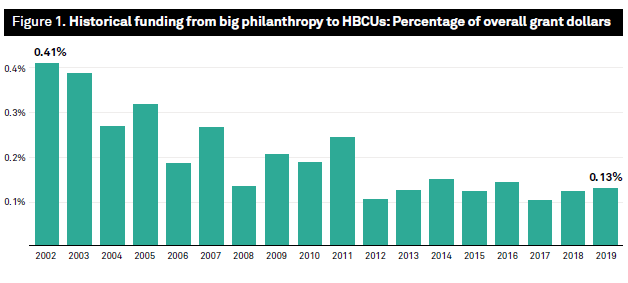 Subscribe
Subscribe- Login
-
/
Sign Up
- US Black Engineer
- >>
- Articles
- >>
- New report reveals legacy of chronic underfunding to HBCUs
A new report titled “Philanthropy and HBCUs: Foundation funding to historically Black colleges and universities” has been released by Candid and ABFE. The comprehensive analysis of private philanthropic support given to historically Black colleges and universities (HBCUs) features 18 years of funding data for 103 HBCUs, interviews with HBCU staff and funders, and a focus group with HBCU students.
The report, Philanthropy and HBCUs, reveals that large US foundations have consistently decreased their support for HBCUs between 2002 and 2019. In 2002, they awarded $65 million to HBCUs, which dropped by 30% to $45 million by 2019 without adjusting for inflation.
The findings also show that between 2015 and 2019, Ivy League institutions received 178 times more foundation funding than HBCUs. Ivy League schools received $5.5 billion in philanthropic donations, while HBCUs received only $303 million.
Furthermore, when compared to similar higher education institutions in terms of size, location, and type, HBCUs received an average of two-thirds of the funding that foundations paid out to similar composites.

HBCUs account for approximately 3% of all colleges and universities and award 13% of all bachelor’s degrees to Black college graduates nationwide. HBCUs have been instrumental in educating Black people, developing Black leaders, and addressing inequality. They provide supportive environments for college and community engagement and are centers of social activism, cultural hubs, and builders of community.
Cathleen Clerkin, senior director of insights at Candid, emphasized the need for a stronger research foundation to tackle racial inequity in the social sector. The hope is that their latest report will lead to increased visibility and discourse about equitable investment in HBCUs to ensure their continued success.
According to Susan Taylor Batten, the president and CEO of ABFE, HBCUs are critical institutions in Black communities, despite being underfunded and having lower endowments. As an alum of two HBCUs herself, she believes that philanthropy can partner with HBCUs to create more sustainability for future generations. She urges the sector to invest adequately in HBCUs and address systemic challenges in order to ensure their future.
Foundations can demonstrate their commitment to building equity for HBCUs by consistently funding them. While foundations increased funding and collaborative opportunities with HBCUs in 2020, it is uncertain whether this trend will continue. Therefore, HBCUs need consistent funding to ensure their sustainability. Additionally, building relationships with HBCUs and supporting their development can help to address systemic challenges and ensure their success.



